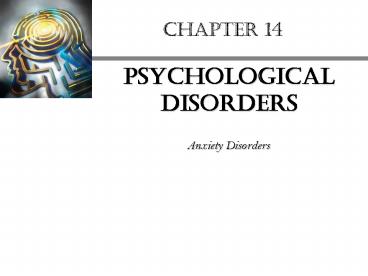Psychological Disorders - PowerPoint PPT Presentation
1 / 9
Title:
Psychological Disorders
Description:
CHAPTER 14 Psychological Disorders Anxiety Disorders Anxiety Disorders Several kinds of anxiety disorders generalized anxiety disorder Panic disorders Agoraphobia ... – PowerPoint PPT presentation
Number of Views:225
Avg rating:3.0/5.0
Title: Psychological Disorders
1
CHAPTER 14
- Psychological Disorders
- Anxiety Disorders
2
Anxiety Disorders
- Several kinds of anxiety disorders
- generalized anxiety disorder
- Panic disorders
- Agoraphobia
- Specific phobias
- Generalized anxiety Disorder
- feeling of stress and unease most of the time
- overreacts to stressful conditions.
3
Anxiety Disorders
- Panic disorder
- sudden and intense attack of anxiety
- symptoms including rapid breathing, high heart
rate - feelings of impending disaster.
- Agoraphobia
- More a result of panic disorders and generalized
anxiety disorder - Becomes fearful of situations which elicit
panic/anxiety - Begin to avoid these areas
- But generalizes- soon afraid of everywhere!
- Phobias
- experiences fear or stress when confronted with a
particular situation - such as crowds, heights, enclosed spaces, open
spaces, dogs, or snakes.
4
Treatment of Anxiety Disorders
- Benzodiazepines
- most frequently used anxiolytic (antianxiety)
drugs in the past. - increase receptor sensitivity to the inhibitory
transmitter GABA. - Suggests deficit in benzodiazepine receptors may
be one cause of anxiety disorder. - Anxiety also appears to involve low activity at
serotonin synapses. - Antianxiety drugs
- initially suppress serotonin activity
- then produce a compensatory increase.
5
Related Brain structures and Anxiety Disorders
- Number of brain structures activated in anxiety
- amygdala
- locus coeruleus.
- Both structures participate in more specific
emotions, such as fear. - Drugs which decrease action in the locus
coeruleus are anxiolytic - Drugs which increase its action increase anxiety.
6
Obsessive compulsive disorders
- Obsessive-compulsive disorder (OCD)
- consists of two behaviors
- obsessions
- Compulsions
- Often occur in the same person.
- An obsession
- recurring and intrusive thought.
- A person may be annoyed by tune that mentally
replays over and over, - Plagued by troubling thoughts such as wishing
harm to another person. - Compulsive behavior
- Individual compelled to engage in ritualistic
behavior - touching a door frame three times before passing
through - endless hand washing
- Excessive checking to see if appliances are
turned off.
7
Brain changes in ocd
- PET studies
- OCD patients have increased activity in the
orbital frontal cortex - Also in part of the basal ganglia, the caudate
nuclei. - Helps explain motor component
- Excess activity decreases following
- drug treatment
- Also with behavior therapy.
- White matter abnormalities
- suggest defect in connections of the cingulate
gyrus with a circuit involving the basal ganglia,
thalamus, and cortex - apparently results in a loss of impulse control.
- OCD patients show too high of serotonergic
activity. - only drugs that consistently improve OCD symptoms
are antidepressants that inhibit serotonin
reuptake. - Make serotonin more available in synapse
- Alters production/reuptake
- Suggests it is the reuptake receptors that may be
at fault
8
(No Transcript)
9
Heritability of anxiety disorders
- Family and twin studies
- anxiety disorders appear to be genetically
influenced, - heritabilities ranging between .20 and .43,
depending on the disorder. - Why important to understanding the hereditary
underpinnings of anxiety? - significant genetic overlap with other disorders
- Dopaminergic or monoamine cluster disorders.
- Over 90 of individuals with anxiety disorders
also have history of other psychiatric problems. - Overlap with affective disorders is particularly
strong. - 50-60 of patients with major depression also
have a history of one or more anxiety disorders - panic disorder is found in 16 of bipolar
patients. - Family clusters
- Drug abuse/alcohol abuse
- ADHD
- Affective disorders
- OCD
- Schizophrenia































